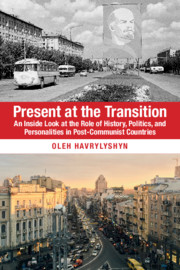 Present at the Transition
Present at the Transition An Epilogue
from Part IV - Outcomes and Prospects
Published online by Cambridge University Press: 04 May 2020
An epilogue first notes that the only notable recent development not covered in the book is the slippage of democratic standards in Hungary, and less so Poland, albeit signs this may spread exist. However, this would not appear to be a transition-related dynamic, as it parallels the same trend of nationalist-populism in Europe and elsewhere. Speculating on possible future developments, it is concluded that little change is likely in the near-term. Those that have completed transition (and now EU members or candidates) are like other market democracies and their problems will be the same. The authoritarian reversal farther East that began in 2000 is unlikely to be infected by democratic inclinations of entrenched leaders, nor for that matter efforts to complete the economic transition – the status quo suits those in power very well and opposition is completely marginalized. Only Ukraine and Moldova are in a middle ground, with potential for moving closer to the EU, to more democracy, and fuller markets – but, at the same time, domestic vested interests continue to slow any movement in this direction, muddling through would seem a likely outcome.
To save this book to your Kindle, first ensure [email protected] is added to your Approved Personal Document E-mail List under your Personal Document Settings on the Manage Your Content and Devices page of your Amazon account. Then enter the ‘name’ part of your Kindle email address below. Find out more about saving to your Kindle.
Note you can select to save to either the @free.kindle.com or @kindle.com variations. ‘@free.kindle.com’ emails are free but can only be saved to your device when it is connected to wi-fi. ‘@kindle.com’ emails can be delivered even when you are not connected to wi-fi, but note that service fees apply.
Find out more about the Kindle Personal Document Service.
To save content items to your account, please confirm that you agree to abide by our usage policies. If this is the first time you use this feature, you will be asked to authorise Cambridge Core to connect with your account. Find out more about saving content to Dropbox.
To save content items to your account, please confirm that you agree to abide by our usage policies. If this is the first time you use this feature, you will be asked to authorise Cambridge Core to connect with your account. Find out more about saving content to Google Drive.